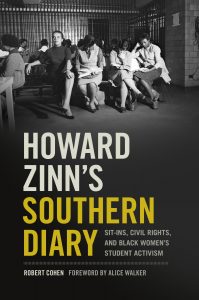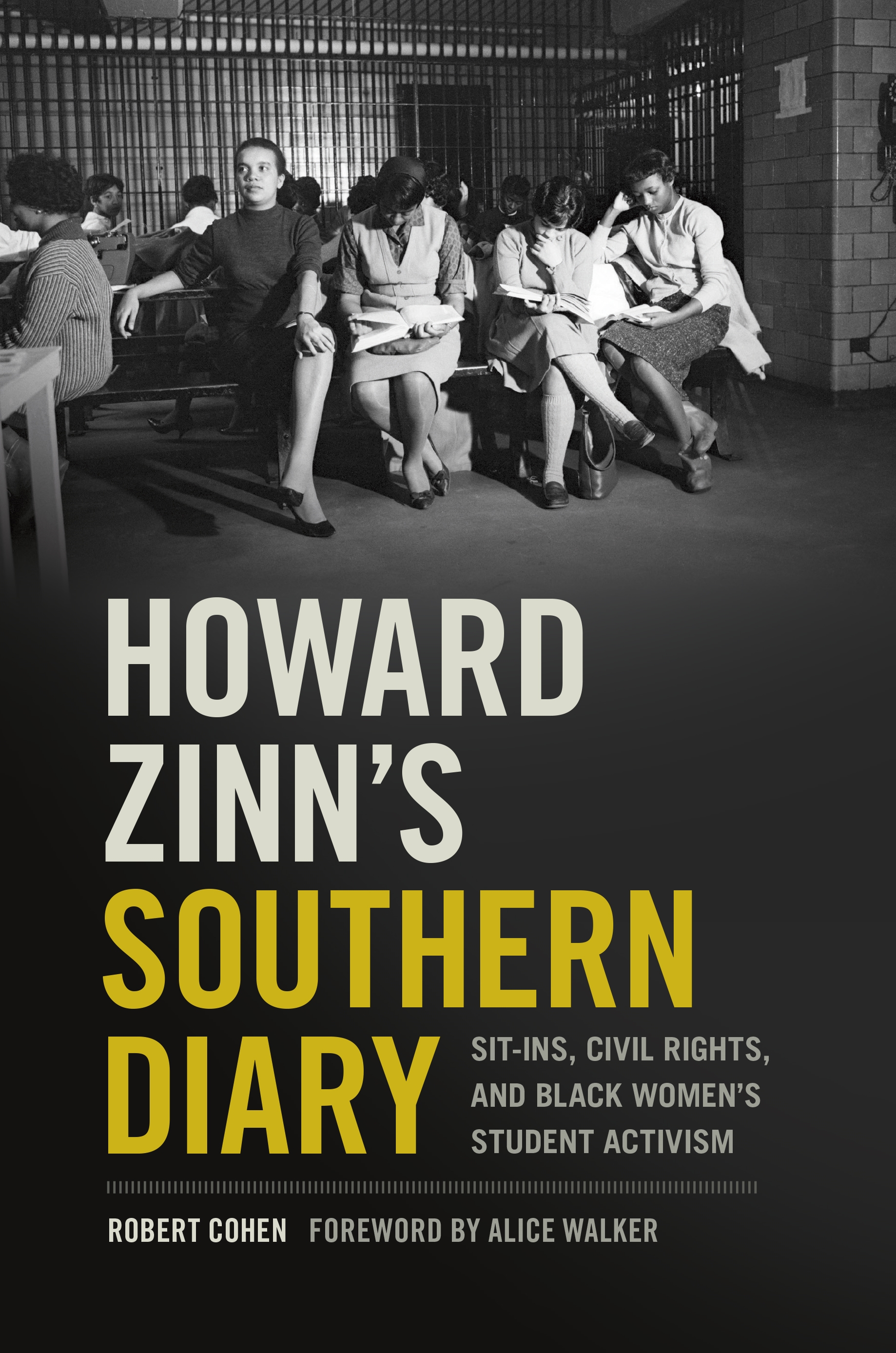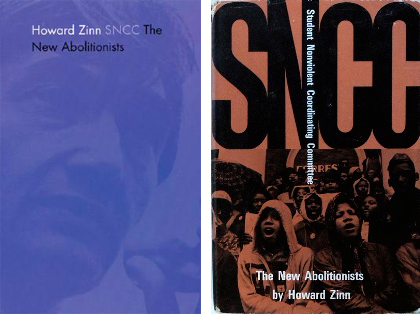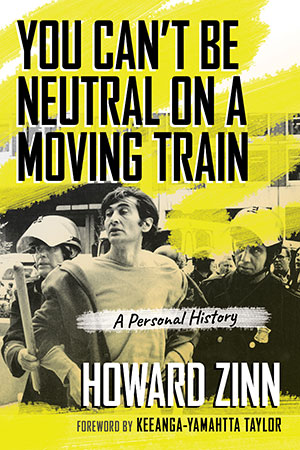 We are pleased to announce the University of Georgia Press publication of Howard Zinn’s Southern Diary: Sit-Ins, Civil Rights, and Black Women’s Student Activism by Robert Cohen with a foreword by Alice Walker. The book includes diary entries from Howard Zinn’s time teaching at Spelman College (1956-1963). Historian Robert Cohen offers a substantial overview of Zinn’s role at Spelman and other archival documents, including Zinn’s arguments in a debate about the House Un-American Activities Committee (HUAC) at Emory University.
We are pleased to announce the University of Georgia Press publication of Howard Zinn’s Southern Diary: Sit-Ins, Civil Rights, and Black Women’s Student Activism by Robert Cohen with a foreword by Alice Walker. The book includes diary entries from Howard Zinn’s time teaching at Spelman College (1956-1963). Historian Robert Cohen offers a substantial overview of Zinn’s role at Spelman and other archival documents, including Zinn’s arguments in a debate about the House Un-American Activities Committee (HUAC) at Emory University.
We offer two book excerpts by Howard Zinn: A diary entry about his teaching methods and a witty passage from the transcript of the HUAC debate.
Diary Entry
This 1963 entry is on page 113 of Howard Zinn’s Southern Diary.
Thurs. Jan 7
First US history class on civil liberties. Handed out cards, asked students to copy down “I hereby affirm, as a member of this class, that I am not a member of an organization dedicated to the overthrow of the govt. by force and violence.” Said: “And now, sign your name.” I saw looks of consternation on a few faces, amazement on a few, many signed. In general the new students who didn’t know me signed, my old students were suspicious and two of them blurted out, “I won’t.” Sarah Marshall said, “Mr. Zinn I’d like to discuss it”; I said, “Sorry, no discussion on this point.” And then all sorts of excited comment back and forth broke out, arguments among the students about whether to or not to sign, arguments with me. After it all I made the point that civil liberties in the abstract is one thing; an actual situation faced by people, immediate, no preparation, with someone in authority expecting . . . [something] of them, makes it difficult to resist.
Debate on Abolishing the House Un-American Activities Committee (HUAC)
This transcript excerpt from the February 11, 1963, debate between Howard Zinn and HUAC Research Director E. Fulton Lewis III is on pages 227-229 of Howard Zinn’s Southern Diary. The debate took place at Emory University.
SPELMAN COLLEGE PROFESSOR HOWARD ZINN: I only have thirty minutes so I thought I would begin with the Stone Age. Mankind has gone through the age of stone and the age of bronze, and today we live in the age of irony (laughter). Probably in the twentieth century the ironies are more monumental than ever. But I am not going to pick one of these stupendous ironies nor one of the petty ones. Let’s call it a middle-level irony. And it goes something like this. We the American people do not want to live in a Communist state. The reason for this is not so much that we object to a planned economy, although many of us do. Not so much that we object to socialized medicine, there’s some controversy about this, this may be a factor. Certainly not because we’re afraid that if we live in a Communist society Coca-Cola will be replaced by borscht (laughter) or that we have anything against the Bolshoi Ballet or vodka, that’s not it. We don’t want to live in a Communist society because we don’t want to live in a situation in which the government or some agency of government is supervising our ideas and our associations to make sure that we hold no idea, believe in no political ideology, which is contrary to the official dogma. We don’t want to live in a Communist state because we don’t want any government agency inspecting what we say, what we think, the associations we have, the paintings we paint, the writings we write, the books we read, the meetings we go to, the organizations we join. We don’t want to be in a situation where people around us are watching us and may inform on what we say or where we go, or the petitions we sign. We don’t want to live in a situation where opposing the official credo may result in going to prison, where disagreeing with this governmental agency will send somebody to jail.
And so in order to avoid all this we set up a [House] Committee [on Un-American Activities]. And this committee in order to prevent us from experiencing this inspects what we read, looks at who we associate with, checks up on the things we write, the books we read, the associations we have, the meetings we go to, the wife that we married. It also employs paid informers to keep track of what people do, what they say, where they go. It also sends people to jail for disagreeing with the committee. Now the premise of this irony is that we don’t really mind if our freedoms are taken away from us so long as it’s done by Americans (laughter). And also that it is all right to take our freedoms away from us today because this will strengthen us to meet the trials of tomorrow.
The House Committee on Un-American Activities was founded in 1938. It had two predecessors, the Overman Committee of 1919 [and] the Fish Committee of 1930. They had roughly the same object. In 1938 the House Un-American Activities Committee was created as an ad hoc committee. The chairman, well I don’t think I’m being unfair when I say that the chairman, Martin Dies, was not selected from among the most brilliant members of the House. The chairman was Martin Dies of Texas; this became known as the Dies Committee. And you all perhaps know, well it’s not necessary to say anything about the Dies committee. It saved our country (laughter). It investigated Brooklyn College, which everybody knows is the seat of subversion in this nation (laughter). It investigated the Federal Writers Project, and writers are among the most dangerous people in this country. It investigated the Farmer-Labor Party of Minnesota. And well, all you have to do is look on a map and see the strategic location of Minnesota. It is right next to Iowa (laughter). And not far away from Wisconsin, and then there’s the Schlitz Brewery Company (laughter) which is right near. If the Communists got control of the Schlitz Brewery company (laughter), well . . . .
This committee became a permanent committee in 1945. The man most responsible for making it permanent was another one of our great congressmen, John Rankin of Mississippi. As an example of Mr. Rankin’s incisive comments on Communism, of which he was one of the nation’s most assiduous students, July 18, 1945, on the floor of the House, John Rankin speaking: “These alien-minded Communistic enemies of Christianity and their stooges are trying to get control of the press of the country. Many of our great daily newspapers have now changed hands and gone over to them. They’re trying to take over the radio. Listen to their lying broadcasts in broken English” (laughter). It’s clear that the committee fulfilled its function. I listened to the radio yesterday for a while. I heard no broken English. All I heard were things like “I’m crazy about you, baby, cause you’re so sweet” or something like that. The radio has been cleared of Communist propaganda, it seems to me, very effectively (laughter).
Now since then the IQ of the committee, since those days, since the days of Rankin, has gone up. But the values remain the same. It’s important to take a look at the enabling resolution passed by Congress which gives the committee its legal power. It’s important to know this because this is the legal foundation upon which the committee operates. This is what the committee is supposed to be doing. And this resolution says that the committee is authorized to conduct investigations “into the extent, character, and objects of un-American propaganda activities in the United States.” And too, “the diffusion within the United States of subversive and un-American propaganda that attacks the principle of the form of government as guaranteed by our Constitution.” I want you to note that both requirements are that propaganda be investigated.
No one on the committee, incidentally, as far as I can see, has given a very satisfactory answer to the question of exactly what is un-American propaganda. What is American propaganda? What is subversive, what is un-subversive propaganda? Dies, in the good old days, said that if you didn’t believe in God this was an example of un-American thinking, and if you believed in a planned economy this was an example of un-American thinking. The most recent definition I’ve seen was given by the chairman Congressman [Francis E.] Walter in 1961 . . . (this was on [the] “Youth Wants to Know” television program), [who, in response to a] question from a young student, [said]: “Sir for our own information could you tell us just what is considered un-American by your committee?” Walter: “Well any activity that strikes at the basic concept of our republic.” That’s a good clean answer, isn’t it? (Laughter.)
“Any activity that strikes at the basic concept of our republic.” What is the basic concept of our republic? Well, I will offer my own answer. The basic concept of our republic, I think, is that no government agency has the right to say what is the basic concept of our republic because the principles of American democracy are changing things. They are hammered out on the anvil of experience. They are debated and redebated and they engage in [a] kind of dynamic process of reverberation of opinion and atmosphere of freedom. And they’re not subject to the kind of vague or ultraspecific definition which the House Un-American Activities Committee enjoys giving.











Twitter
Google plus
LinkedIn